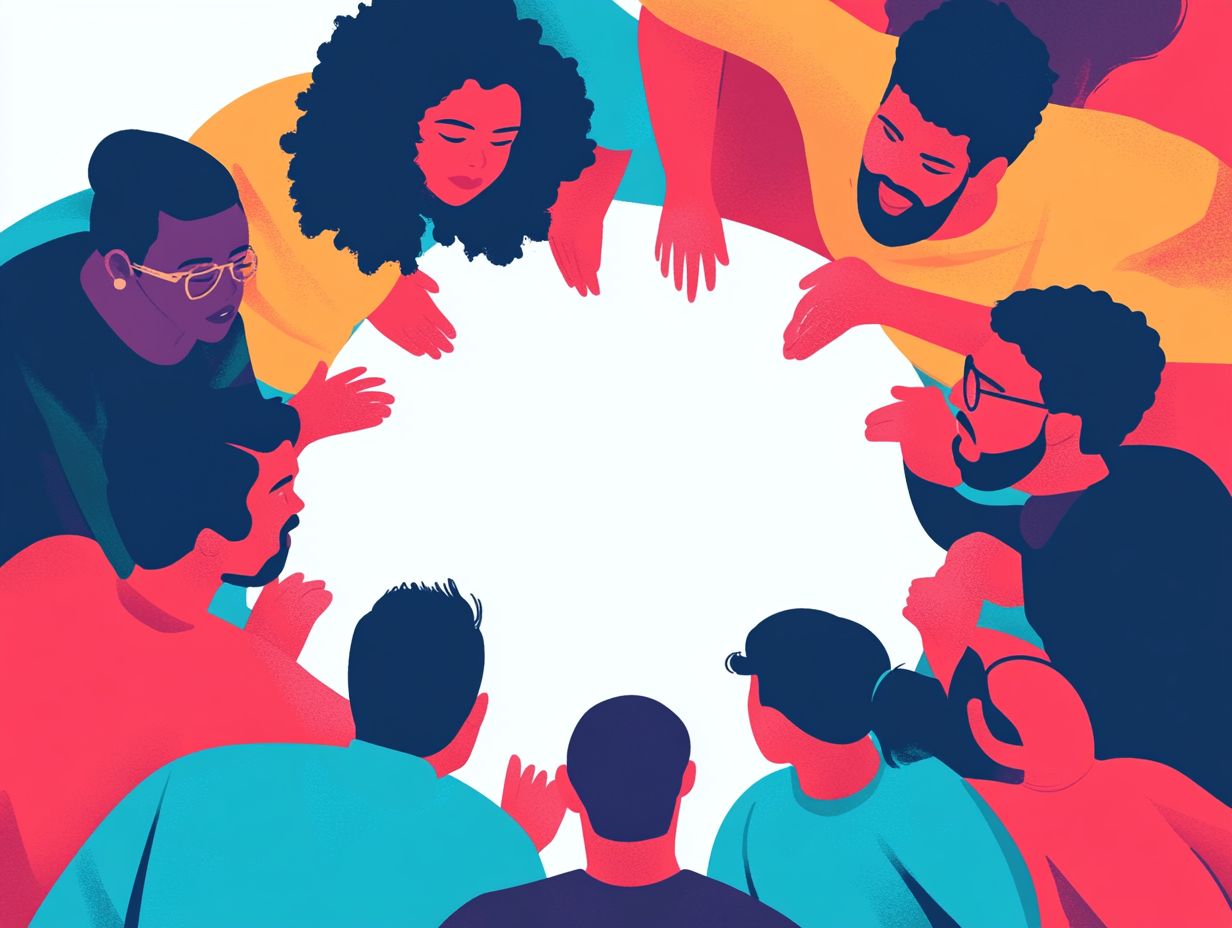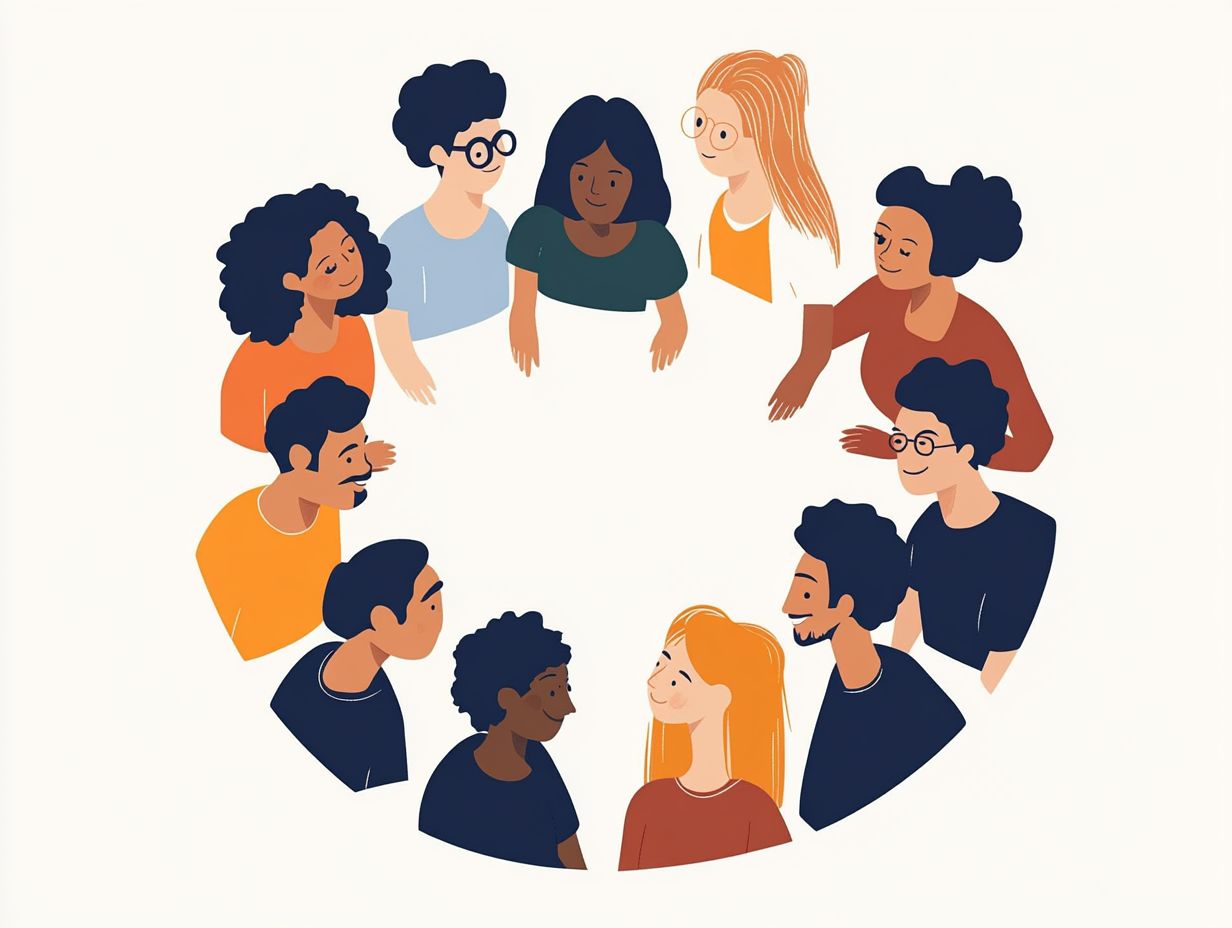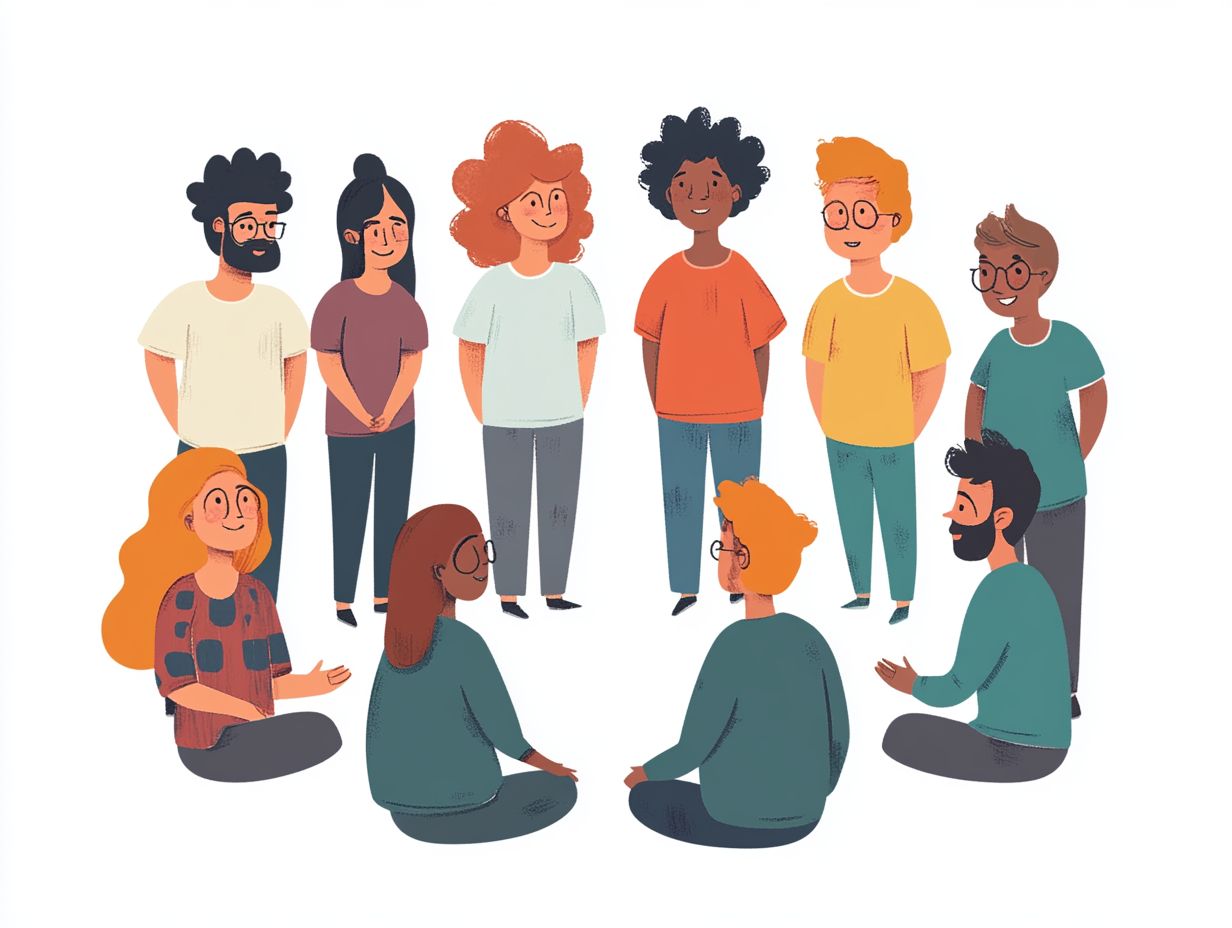How to Guide Others in Overcoming Limiting Beliefs
Limiting beliefs can hold you back, shaping your perceptions of what s truly possible in your life. These internal narratives greatly influence your choices, relationships, and overall well-being.
This article explores what limiting beliefs are, how they impact you, and why recognizing them is essential for your personal growth. It also discusses practical tools like positive affirmations, visualization, and journaling that can help you break free from these constraints.
Are you ready to embrace your journey towards empowerment and understanding?
- Key Takeaways:
- Understanding Limiting Beliefs
- Identifying and Addressing Limiting Beliefs
- Recognizing Your Own Limiting Beliefs
- Helping Others Identify Their Limiting Beliefs
- Tools and Techniques for Overcoming Limiting Beliefs
- Positive Affirmations
- Visualization
- Supporting Others in Their Journey
- Frequently Asked Questions
- What are limiting beliefs and how do they affect us?
- How can I identify someone’s limiting beliefs?
- How can I guide someone in overcoming their limiting beliefs?
- What are some effective techniques for overcoming limiting beliefs?
- Why is it important to challenge limiting beliefs?
- How can I continue to support someone in their journey of overcoming limiting beliefs?
- Recognize the power of limiting beliefs and how they can hold us back from reaching our full potential.
- Assist others in identifying their own limiting beliefs by asking thought-provoking questions and providing a safe, supportive environment for self-reflection.
- Encourage the use of effective tools and techniques such as positive affirmations, visualization, and journaling to overcome limiting beliefs and achieve personal growth.
Contents
Key Takeaways:

Understanding Limiting Beliefs
Understanding limiting beliefs is essential for your personal development. These beliefs often shape your self-perception.
Limiting beliefs are the negative thoughts and assumptions you harbor about yourself. They keep you confined within your comfort zone and stop you from reaching your goals.
By recognizing these beliefs, you can enhance your self-awareness and cultivate a deeper emotional connection with your true self. This ultimately paves the way for transformative thinking.
What are Limiting Beliefs?
Limiting beliefs are those deeply ingrained convictions that hold you back, stifling your potential. They impede your journey of self-improvement.
Often, these beliefs find their roots in negative self-perceptions formed during early experiences. You might encounter these limiting beliefs in various aspects of your life.
For instance, you might convince yourself that you re not smart enough to pursue higher education or let the fear of failure prevent you from applying for that dream job. You may have internalized the notion that you re inherently bad at public speaking due to a less-than-stellar experience in school, leading you to shy away from leadership roles.
On the flip side, embracing new beliefs can unlock a world of opportunities and nurture resilience. By replacing fear with the understanding that growth arises from challenges, you can develop a mindset focused on self-awareness and personal development.
This shift enables you to break free from the constraints of earlier convictions and reach new heights.
How do They Affect Us?
Limiting beliefs can profoundly impact your mental health and stymie your journey toward personal goals. They often leave you grappling with an overwhelming fear of failure.
These beliefs are like invisible chains, preventing you from reaching your full potential. Imagine someone who constantly thinks, “I am not good enough to succeed in my career.” This mindset not only curtails ambition but also fosters anxiety and self-doubt.
On the other hand, consider an individual who recognized and confronted similar limiting beliefs. By embracing emotional strength, they embarked on a path to pursue their passion and ultimately achieved their goals.
These success stories illustrate that breaking free from such constraints is vital for cultivating resilience and paving the way for a healthier, more fulfilling life.
Identifying and Addressing Limiting Beliefs
Identifying and addressing your limiting beliefs is a crucial step in fostering personal growth, especially when it comes to overcoming limiting beliefs in the workplace. This process demands self-reflection.
It often benefits greatly from coaching techniques that help you effectively question and challenge those deeply ingrained beliefs, such as how to overcome limiting beliefs in sports.
Start recognizing your limiting beliefs today and unlock your potential!
Recognizing Your Own Limiting Beliefs

Recognizing your own limiting beliefs starts with self-awareness. You can enhance this journey through daily practices like reflective journaling and mindful self-talk.
Take a moment to pause and reflect on your thoughts and emotions. This can help you uncover the hidden narratives that shape your perceptions and behaviors. Ask yourself open-ended questions such as, “What do I truly believe about my abilities?” or “How do these thoughts serve or hinder my goals?”
Using a journal not only helps document these inquiries but also creates a space for profound reflection. Each entry can unveil patterns and triggers linked to those limiting beliefs, fostering clarity and guiding you toward healthier, more enabling perspectives.
Over time, these practices can cultivate a mindset that embraces growth and resilience, setting the stage for your personal evolution.
Helping Others Identify Their Limiting Beliefs
Helping others identify their limiting beliefs requires strong coaching support and the cultivation of an emotional bond. By learning how to mentor someone through limiting beliefs, you can create a safe space that allows enabling thoughts to flourish.
In this nurturing environment, mentoring platforms become essential. They offer guidance and resources that encourage deeper exploration of thoughts. Your social circles also play a significant role; surrounding yourself with uplifting peers helps you feel more validated and understood.
To foster these crucial emotional connections, active listening is vital. Encourage individuals to share their thoughts without fear of judgment. Utilize open-ended questions during conversations to spark deeper reflections and prompt them to confront their inhibitions openly.
By combining these strategies, you have the power to break down limiting beliefs, unveiling fresh perspectives and new paths to growth.
Tools and Techniques for Overcoming Limiting Beliefs
Powerful tools and techniques like positive affirmations, visualization exercises, and imagery exercises can enable you to conquer your fears and transform limiting beliefs into avenues for self-improvement.
This not only enhances your resilience but also paves the way for personal growth and greater fulfillment. Embrace these strategies, and watch as they elevate your journey toward becoming the best version of yourself.
Positive Affirmations
Positive affirmations are powerful tools that can transform your self-talk and foster confidence by reinforcing uplifting thoughts each day.
Consciously choosing to focus on positive beliefs helps challenge and counteract negative self-perceptions that often stem from past experiences or external criticism. Research indicates that regularly repeating affirmations can boost your self-esteem and cultivate a more optimistic outlook.
For example, telling yourself, “I am capable of achieving my goals,” can dispel feelings of inadequacy. To maximize the impact of these affirmations, weave them into your morning routine or jot them down in a journal. Creating a dedicated space for these messages allows you to reflect on them regularly.
Over time, such practices can lead to a significant shift in your mindset.
Visualization
Visualization is a powerful mental technique that allows you to envision results and outcomes. This ultimately enhances your mental health and boosts your chances of achieving your goals by countering limiting beliefs.
By tapping into this remarkable tool, craft vivid mental images of your desired aspirations, turning abstract dreams into concrete realities. Engaging in focused visualization exercises like guided imagery or creating dream boards connects you with your subconscious, promoting positive affirmations and reinforcing your belief in success.
For instance, if you visualize yourself thriving in high-pressure situations like public speaking, the usual nervous energy associated with fear can transform into a surge of confidence. These techniques cultivate resilience and nurture a mindset that anticipates positive outcomes, significantly enhancing your overall psychological well-being.
Take action now! Start implementing these tools and techniques, including how to use meditation for limiting beliefs, to overcome limiting beliefs and unlock your full potential.
Journaling

Journaling is a powerful habit that invites you to delve deeper into self-awareness while strengthening your emotional resilience. It provides a platform for questioning your beliefs and reflecting on your experiences.
As you write, you can explore thoughts and feelings that might otherwise go unexamined. This creates a valuable space for clarity and understanding. To fully benefit from journaling, consider techniques like free writing, where your thoughts flow freely and unfiltered, or structured prompts that guide your reflections.
For instance, pondering what truly matters in your life or jotting down moments of gratitude can illuminate your path toward personal growth.
By identifying and challenging limiting beliefs through a careful examination of those pesky recurring negative thoughts, you can cultivate a mindset that enables you to break free from self-imposed barriers. Consider exploring overcoming limiting beliefs for a structured approach to this process.
Supporting Others in Their Journey
Supporting others in their journey to overcome limiting beliefs requires a blend of empathy and understanding. By learning how to transform limiting beliefs, you can offer support and hold each other accountable to create a nurturing environment that fosters an inspiring community where personal growth can truly flourish.
Empathy and Understanding
Empathy and understanding serve as the cornerstones of building an emotional connection. This connection can profoundly elevate your coaching support and facilitate personal growth within your social circles.
When you, as a coach, show genuine empathy, you create an atmosphere where individuals feel valued and truly heard an essential ingredient for their development. For example, when a mentor actively listens to a coachee’s challenges, it opens the door to identifying limiting beliefs that might otherwise remain unexamined.
In these relationships, you can use reflective questioning asking questions that help people think about their feelings to guide individuals toward deeper self-awareness, enabling them to confront those beliefs. This dynamic fosters trust and helps individuals transcend barriers, paving the way for meaningful breakthroughs and a richer social experience.
Encouragement and Accountability
Encouragement and accountability are essential elements in fostering your personal growth and self-improvement, especially through targeted coaching techniques that enhance your emotional strength.
By cultivating a supportive atmosphere, you enable yourself to take risks and explore your potential without the fear of judgment. Techniques like active listening allow coaches to genuinely grasp the unique challenges you face.
For instance, when a coach sees a setback not as a failure but as a valuable learning opportunity, it nurtures your resilience. Establishing measurable goals is key to maintaining accountability. Regular check-ins not only help you track your progress but also create a space for celebrating achievements, no matter how small they may seem.
These strategies will boost your personal development and keep you committed to your growth journey.
Frequently Asked Questions
What are limiting beliefs and how do they affect us?

Limiting beliefs are negative thoughts or beliefs that hold us back from achieving our full potential. They can create self-doubt, fear, and limit our actions and choices.
How can I identify someone’s limiting beliefs?
Pay attention to their language and behavior. Negative self-talk, self-sabotage, and avoiding certain situations or opportunities can be signs of limiting beliefs.
How can I guide someone in overcoming their limiting beliefs?
Start by creating a safe and supportive environment for them to share their thoughts and beliefs. Then, help them overcome limiting beliefs through open and honest communication.
What are some effective techniques for overcoming limiting beliefs?
Encourage positive self-talk, visualization, and goal-setting. Also, encourage them to swap negative thoughts for positive ones and focus on their strengths and accomplishments.
Why is it important to challenge limiting beliefs?
Limiting beliefs can hold us back from reaching our full potential. They can lead to self-sabotage and missed opportunities.
Challenging these beliefs lets us break free from their constraints. It opens the door to a more fulfilling life.
How can I continue to support someone in their journey of overcoming limiting beliefs?
Make it a habit to check in regularly! Remind them of their progress and strengths.
Offer encouragement and support. Celebrate their successes along the way.
Encourage them to practice positive thinking and reflect on their feelings.






